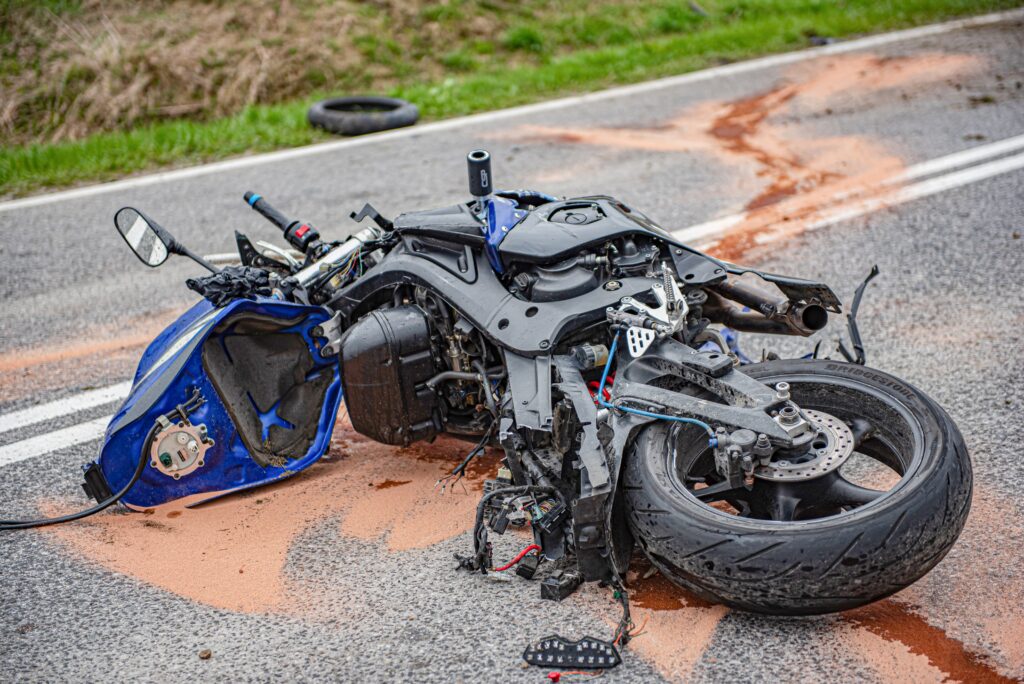Motorcycle crashes typically happen when other drivers violate rules of the road, drink and drive, exhibit road rage, or operate their vehicles recklessly. However, in an effort to deny or undervalue a claim, insurance companies frequently accuse motorcyclists of causing or contributing to an accident.
A knowledgeable Omaha motorcycle accident attorney can challenge these disputes, fight for your rights, and pursue the fair compensation you deserve. Your lawyer can also file a lawsuit in the court system and obtain a favorable litigation result on your behalf in court.
How Do Negligent Drivers Cause Motorcycle Crashes?
Negligent drivers often cause collisions with motorcycles due to their lack of attention, failure to follow traffic laws, or disregard for motorcyclists’ safety. These accidents can be particularly devastating, given the vulnerability of motorcycle riders compared to drivers in enclosed vehicles.

- One common cause of motorcycle crashes is when drivers fail to check their blind spots before changing lanes. Motorcycles are smaller and can be easily overlooked, leading to dangerous lane-change collisions.
- Another frequent scenario occurs at intersections, where drivers may not see an oncoming motorcycle and turn left in front of it, resulting in a T-bone crash. This type of collision is especially hazardous for motorcyclists, who may not have enough time or space to avoid the collision.
- Distracted driving is another significant factor in motorcycle accidents. When drivers are texting, talking on the phone, or engaging in other activities that take their eyes off the road, they may not notice a motorcycle in their vicinity. A moment of inattention can lead to a rear-end collision, where a car strikes a motorcycle from behind, often throwing the rider off the bike and causing serious injuries.
- Speeding also contributes to motorcycle accidents. When a car is traveling at high speeds, the driver has less time to react to a motorcycle in their path, and the impact of a collision is much more severe. Speeding drivers may also misjudge the speed and distance of an oncoming motorcycle, leading to crashes during passing maneuvers or when merging onto highways.
- Finally, driving under the influence of drugs or alcohol is a major cause of motorcycle accidents. Impaired drivers have slower reaction times, impaired judgment, and reduced coordination, making it more likely that they will collide with a motorcycle.
These negligent behaviors lead to various types of motorcycle accidents, including side-swipes, rear-end collisions, T-bone crashes, and head-on collisions. Each type of accident can result in catastrophic injuries for motorcyclists, such as broken bones, spinal cord injuries, traumatic brain injuries, and even fatalities.
Common Injuries in Motorcycle Collisions
Victims of motorcycle accidents often suffer from severe physical and mental injuries due to the negligence of other drivers. These injuries can have long-lasting effects on their health, well-being, and quality of life.
- One of the most common physical injuries in motorcycle collisions is road rash. This occurs when the rider is thrown from the motorcycle and skids across the pavement, causing the skin to scrape off. Road rash may require extensive medical treatment, including skin grafts in the worst cases. If not treated properly, it can also lead to infections and permanent scarring.
- Broken bones are another frequent outcome of motorcycle crashes. Riders can easily break their arms, legs, ribs, or collar bones when they collide with another vehicle or are thrown from their bike. Fractures can be extremely painful and often require surgery, physical therapy, and a long recovery period.
- Spinal cord injuries are particularly devastating. When a rider’s spine is injured in an accident, it can result in partial or complete paralysis, depending on the severity and location of the injury. These injuries can be life-altering, leading to a permanent loss of mobility and independence.
- Traumatic brain injuries (TBIs) are also common. Even with a helmet, a severe impact can cause brain damage. TBIs can range from concussions to more severe forms of brain injury, leading to cognitive impairments, memory losses, personality changes, and other neurological issues.
- In addition to physical injuries, motorcycle accident victims often suffer from mental and emotional trauma. Post-traumatic stress disorder (PTSD) is common among those who have experienced a serious accident. PTSD can manifest as anxiety, depression, flashbacks, and a reluctance to ride a motorcycle again. Victims may also experience survivor’s guilt, especially if the accident resulted in fatalities.
The combination of physical pain and mental anguish can significantly affect a victim’s life. Recovering from these injuries often requires extensive medical treatment, psychological therapy, and support from loved ones. The consequences of a motorcycle accident are not just physical but can also deeply affect a victim’s mental health, making the road to recovery challenging.
Reasons Why Insurance Companies May Wrongly Blame Motorcyclists for Accidents
Insurance companies often try to shift the blame onto motorcyclists after an accident, even when the motorcyclist is not at fault. They use this strategy to reduce the amount of compensation they have to pay out. An experienced motorcycle accident lawyer understands these tactics and how to counter them to ensure that justice is served.

One common tactic insurance companies use is to claim that the motorcyclist was speeding. They may argue that the motorcyclist was driving too fast for the road conditions or exceeding the speed limit, even when there is little or no evidence to support this assertion. They rely on the stereotype that motorcyclists are reckless and aggressive drivers, hoping to sway the case in their favor.
Another strategy involves questioning the motorcyclist’s visibility. Insurance companies may argue that the motorcyclist was difficult to see, either due to the bike’s size, the rider’s clothing, or poor lighting conditions. They may even suggest that the motorcyclist was riding in a car’s blind spot, making it hard for the other driver to avoid the accident.
In some cases, insurance companies may focus on the motorcyclist’s maneuvers. They may claim that the rider was weaving in and out of traffic or making sudden lane changes, which allegedly caused the accident. Again, these accusations are often based on stereotypes rather than facts.
Another unfair tactic is blaming the motorcyclist for not wearing proper safety gear, such as a helmet. Even in states where helmets are not legally required, insurance companies may argue that the motorcyclist’s injuries resulted from their own negligence in not wearing a helmet rather than the crash itself.
An experienced motorcycle accident attorney knows how to counter these tactics. First, they will gather evidence, such as traffic camera footage, witness statements, and accident reconstruction reports, to show what really happened. They will also challenge the insurance company’s claims by pointing out inconsistencies or lack of evidence. Moreover, a skilled attorney will highlight any violations of traffic laws by the other driver, such as speeding, distracted driving, or failing to yield. They can also demonstrate that the motorcyclist was following all safety guidelines and riding responsibly at the time of the collision.
By effectively countering the insurance company’s attempts to shift blame, a motorcycle accident lawyer can ensure that the motorcyclist receives the compensation they deserve, covering medical bills, lost income, and other damages resulting from the crash.
Damages You Can Receive for Injuries in a Motorcycle Crash
After a motorcycle accident, victims can pursue compensation for their injuries. This compensation is generally categorized into economic and non-economic damages, both of which aim to address the different ways the accident has affected the victim’s life.
Economic damages are meant to cover the financial costs resulting from the accident. The most significant component of economic damages is usually medical expenses. This includes the cost of emergency room visits, surgeries, hospital stays, medication, physical therapy, and any future medical care that may be necessary due to the injuries sustained in the accident.

In addition to medical bills, economic damages also include lost income. If the injuries prevent the victim from working, either temporarily or permanently, they can seek compensation for the income they have lost during recovery. In more severe cases, where the injuries lead to a long-term or permanent disability, the victim may also be entitled to compensation for loss of earning capacity. This reflects the income they would have earned if the accident had not occurred.
Property damage is another form of economic compensation. After a motorcycle accident, the victim can seek reimbursement for the cost of repairing or replacing their damaged motorcycle and any other personal property, such as a helmet or riding gear.
Non-economic damages are more subjective and cover the intangible losses resulting from the accident. Pain and suffering is a major component of non-economic damages. This compensates the victim for the physical pain and emotional distress the accident and its aftermath caused. The severity of the injuries, the recovery process, and the repercussions on the victim’s quality of life are all considered when determining the amount of pain and suffering damages.
Another type of non-economic damage is loss of enjoyment of life. If the injuries prevent the victim from participating in activities they once enjoyed, such as hobbies, sports, or social events, they may receive compensation for this loss.
In some cases, victims may also be entitled to compensation for emotional distress or mental anguish the accident caused, especially if they suffer from conditions like post-traumatic stress disorder (PTSD).
Both economic and non-economic damages are crucial in providing full and fair compensation to motorcycle accident victims. They help address the financial burdens and emotional toll that such an accident can impose, allowing the victim to focus on recovery and rebuilding their life.
What Happens During Motorcycle Accident Litigation?
Motorcycle accident litigation involves taking legal action in court to seek compensation for injuries and damages after a crash. While many motorcycle accident claims settle out of court through negotiations with insurance companies, litigation may be necessary when the parties cannot reach a fair settlement or when the insurance company denies liability.
The litigation process begins when your attorney files a lawsuit on your behalf. This legal action typically follows unsuccessful settlement negotiations, where the insurance company either refuses to offer adequate compensation or tries to unfairly blame you for the accident. Once your lawyer files the lawsuit, the legal process officially begins, and both sides start preparing their cases for trial.
The first phase of litigation is discovery. During discovery, both sides gather evidence, exchange documents, and take depositions. Depositions involve witnesses and parties to the case giving sworn testimony under oath, which the attorneys can later use in court. Your attorney will work to build a strong case by collecting medical records, accident reports, witness statements, and expert opinions, such as accident reconstruction specialists.
After discovery, the next step is pre-trial motions. These are legal arguments the attorneys make to the judge about how the case should proceed. For example, your lawyer may file a motion to exclude certain evidence that can unfairly prejudice the jury or seek a summary judgment if the facts of the case strongly support your claim.

In some cases, the parties may still reach a settlement before going to trial. However, if the parties reach no agreement, the case will proceed to trial. At trial, both sides present their evidence and arguments to a judge or jury. Your attorney will argue that the other party’s negligence caused your injuries and will seek compensation for your medical bills, lost income, pain and suffering, and other damages. The other side will try to refute this and minimize their liability.
Finally, the judge or jury will reach a verdict, deciding who is at fault and the amount of compensation, if any, that should be awarded. If you win, the at-fault party (defendant) or their insurance company may be required to pay damages.
Litigation may be necessary in your case if the insurance company refuses to offer a fair settlement or denies liability. In these situations, taking the case to court can be the best way to secure the compensation you deserve.
Contact an Experienced Motorcycle Lawyer in Your Area Today
If the insurance company has alleged that you caused or contributed to your motorcycle collision, you need to retain skilled legal counsel for representation right away. A knowledgeable personal injury attorney in Omaha can challenge the insurance company and pursue the full compensation you deserve for your losses, either through settlement or litigation.